A champion's thoughts on 2014 - exclusive Mario Andretti Q&A
There wasn’t much that Mario Andretti didn’t experience in his 128-race F1 career, so who better to cast an eye over the first half of 2014 season than the 1978 world champion?
In this exclusive interview, the American offers fascinating views on the current machinery and why some drivers have struggled to adapt to it, the rivalry between Lewis Hamilton and Nico Rosberg, driver penalties, the emergence of Daniel Ricciardo, and more…
Q: So Mario, 2014 brought with it new rules, new power units and new driver pairings - what have you made of the season so far?
Mario Andretti: So far, I think it’s been fabulous quite honestly. From my standpoint I had a big fear that with the massive rule changes from last year to this year we were going to have a lot more reliability issues. And the fact that Mercedes seemed to deal with the massive changes better than anyone else made me think that it could be a totally boring runaway. But even though [Mercedes] have run away with it somewhat so far, it has been anything but boring.
In Nico and Lewis you have two very capable drivers and that’s given us a very interesting battle and something that you can look forward to before every race. The rest of the field seems to be totally mixed up, and from that standpoint you see an incredible amount of overtaking. Then you have the revelation of two really interesting talents in Daniel Riccardo and Valtteri Bottas - those two have come on the scene so strongly - and the fact that Williams have become a factor again… there are just so many storylines - and all of them have been good!
My fear is that I hope they keep getting lucky because with the rules restricting fuel to 100kg I’m concerned about tracks like Spa where there are a lot of straights. Without a safety car period, will they be able to finish the race or will they have to run the last few laps on half throttle?
Q: What have you made of the new technology and how it has impacted on the racing?
MA: Personally, I was always motivated in my career by technology; by new cars and new objectives. I always looked forward to that, and in my opinion I think it’s a strength of Formula One. From last year to this year I think the FIA might have overdone it a little bit [in terms of rule changes]. It was pretty ambitious what with the aerodynamic revisions and, on the technical side, the new engines and all of what the drivers have had to deal with. But it is what it is. On the bright side, things have really been great. We’ve had a few safety cars to keep the races exciting right to the end. I just have a little fear because the situation is looming in terms of fuel conservation. We just have to keep our fingers crossed - if things keep going the way they have up to now it’ll continue to be fabulous.
Q: You were well regarded for your skills in developing a car; do you think you would have enjoyed racing and working with the 2014 machines?
MA: Oh absolutely. I would give anything to shed 30 or 40 years and be able to compete in one of these. Driving today…I’d give anything to drive one of today’s racing cars for sure.
Q: You drove the turbo-powered Ferrari in 1982 after a career of racing normally-aspirated F1 cars. What was that like for you and does it help you appreciate how the drivers have had to adapt their driving styles to this season’s cars?
MA: Well there’s no question that certain drivers have adapted better than others. What worked for me is the fact that I moved around so much between different categories. Adapting was something I had to do. In ’82 I had never driven a turbocharged F1 car. I went in there [to Ferrari] and did a full day of testing at Fiorano with no problems. But honestly, in the race it was just driving - the car responded to my foot and I found no particular difficulties. I could have probably used a bit more practice with starts, but other than that I felt relatively at ease immediately. But going back to adapting, I think it’s something that is ultimately very important, mainly because if you’re a ‘one style’ driver, you’re definitely going to suffer. If you’re a driver that needs a lot of downforce all the time and so on and so forth, you’re going to have a tough time. You’ve got to work on not only what you want and what you need, but also work on what the car needs. Sometimes you don’t exactly ‘get’ the way the car feels, but you’ve got to learn how to maximise what the car has to offer.
Q: On the subject of adapting, Sebastian Vettel has struggled more than people expected this season…
MA: It’s really interesting to see that. Sebastian would probably admit himself that he’s had a tough time adjusting to this big change. He was so tuned in with more downforce and all that. He’s missing that considerably and up to now it has shown. But I think it’s getting better and I have no doubt that he will totally embrace it because his talent is enormous. But it’s probably taken more time than he thought it would. He’s a champion and that will show eventually, but I’m sure no one is more disappointed than he is at this point. He’s totally dedicated - he’s one driver that I think is totally focused on his job; he has no other distractions and that’s all he cares about. He’ll get it done, I’m betting on that for sure. But I’m sure he’s frustrated at the moment.
Q: Do you think it’s a similar situation with Kimi Raikkonen at Ferrari?
MA: I’d agree it’s somewhat similar [to Vettel]. Obviously he’s moved away from Lotus, where I think it worked quite well for him, and gone back to Ferrari where he thought things would be peachy. But the fact that Ferrari struggled to begin with and that he’s ‘come in from the cold’, so to speak, means he’s having a tougher time than Fernando for sure. Fernando is one of those brilliant talents who will maximise everything you throw at him. He’s keeping Ferrari alive very well. Kimi has a little bit of work to do I think.
Q: And in terms of adapting, Alonso have proved himself to be a driver who is very capable in any kind of car...
MA: For sure, no question. He’s an enormous talent and he’s shown that all along. He just knows how to get 100 percent out of everything he’s driving and that’s all you can ask.
Q: One of the biggest stories this year is of course the battle between Mercedes’ Nico Rosberg and Lewis Hamilton for the world title. Did you envisage it going the way it has gone so far, with the intense level of competition between them?
MA: Here’s the thing: it could have been a very boring situation if only one of the two of them took off, a bit like when Michael Schumacher was at Ferrari and you just knew who was going to win. Now it’s nothing like that, and that’s a blessing. It’s early in the season, but the fact that they’ve been devoid of any real team orders - mainly because Mercedes are in a position of luxury - means that the two drivers have been able to steal points from each other and it’s still likely that one of them is going to be world champion.
My hat goes off to Niki Lauda for saying ‘no team orders’. That’s what has kept the interest alive, regardless of whether they’re dominating or not. We’ve seen some epic racing between the two of them. I have a tendency to root a little bit more for Lewis, mainly because of the bad luck he’s had mechanically. When anything happens, it happens to his car and yet he has kept his chin up. And look at the performances he’s had: starting from the pits in Hungary - it was fabulous to see [his drive]. How could you not root for him? He never gave up; he kept his attitude on a positive level. It could have been a total disaster if he’d had his chin down and been beaten mentally, but he’s shown a lot of character this season and if he wins the championship it will be really, really well deserved.
Q: But having said that, Nico Rosberg is fighting his corner very strongly too. Do you think he has performed at a higher level than many thought he was capable of?
MA: Nico has shown himself to be a very solid, worthy competitor. He’s got great racecraft and he would be a worthy champion as well, no question. He’s held up his side brilliantly - that’s what makes it so good. Both Nico and Lewis are capable winners - you can’t take anything away from one or the other, it’s just on Lewis’ side you hate to see what he has had to overcome at times. More than once he’s had some mechanical issues that seem to have afflicted him more than [Nico]. But Nico has definitely shown that he has the class of a champion. Mercedes are very fortunate to have two drivers like that. It’s going to be very interesting to see how the second half of the season unfolds, but it has a lot of promise, no question about it.
Q: You mentioned team orders; we heard Lewis being asked to let Nico through in Hungary, a direction which he ignored. What’s your take on team orders?
MA: Here’s the way I view team orders: if you reach a point in the season where one driver has got the best chance of pulling off a much better result in the championship then I think it’s reasonable enough to help that driver. It makes no sense if you’re fighting for second or third or fourth and you’re just stealing points from one another - you’re both going to end up sixth or seventh. But if you’re in a position like Mercedes then I think they can probably let [Hamilton and Rosberg] fight to the end and not jeopardise the team’s position. That’s the way it should be - the driver that is in the best position in the last three or four races, that’s the guy that the team - and his team mate - should try to help. But until that point it has to be open season, no question about it.
Q: So Mercedes’ points advantage gives them the opportunity to let their drivers fight?
MA: Exactly right - they have that luxury to be able to keep it exciting. The team’s position is not really threatened. As far as the team should be concerned, they should be happy with either driver winning the championship. As long as their position isn’t threatened, let the drivers fight it out. It was interesting the way that Sebastian [Vettel] won his first championship in 2010. With four races to go it looked like he was pretty much written off and at that point it looked like Mark Webber [Vettel’s team mate] was going to be champion. But Sebastian didn’t accept that - he said ‘you know what? I’m racing’. The team let them race and Sebastian pulled it off, and that’s what it’s all about. I’m sure Niki Lauda will fight for this thing at Mercedes to remain an open game.
Q: Of course Daniel Ricciardo, who lies behind the Mercedes drivers in the championship race, isn’t mathematically out of it either. What have you made of his emergence this season?
MA: He’s been fabulous. I mean, I’m sure that he has even surprised himself. He has been consistently quick and doing it very well. I’ve been watching some of his overtaking and it’s just consistently perfect - it’s really aggressive but really well-calculated. He’s showing a lot of class this year and his character is nice too - always with a smile. He keeps himself very cool and calm and he’s doing his things really well. You could tell going in [to Red Bull] that he had nothing to lose because he was certainly not expected to outshine Sebastian. But right from the beginning he took charge and he’s still there. He’s one of the special talents that you love to see now and then. It’s also a good thing that Red Bull’s ‘farm team’ [Toro Rosso] has produced two worthy talents. I love to see that, when talent is promoted from within.
Q: You also singled out Valtteri Bottas in one of your earlier answers - what have you made of his development?
MA: Valtteri showed a lot of talent last year, but this year, with the car being as competitive as it is, he’s solid. He’s another one that’s going to get some results. Once [Williams] gain momentum he’s definitely going to be a player. It bodes very well for Formula One in the future - you always love to see young talents coming on, that’s what keeps it exciting. I think everyone loves Williams too, loves Frank. It’s wonderful to see that they’re a threat, that they can win some races.
Q: Turning to a different subject, a contemporary of yours, Niki Lauda, said earlier this season that drivers should sort out on-track issues themselves, without the intervention of the stewards. Where do you stand on that issue, and on the issue of driver penalties in general?
MA: At this level I really despise when officials get involved in a lot of these situations where they call it ‘avoidable contact’. At this level of the sport, these guys are the best there is. Let them race. If there’s a mistake made and there’s contact…nobody wants to have contact. If you have something really blatant, then I can see [the need for the stewards to intervene]. For instance that move that Michael Schumacher did on Rubens Barrichello a few years ago [Schumacher edged Barrichello dangerously towards the pit wall in the 2010 Hungarian Grand Prix] - that one was so blatant he needed to be spanked. But everything else, leave these guys alone. Perez and Massa in Canada? Let them sort it out. Believe me, drivers know who made the mistake, they know who’s more at fault, so let them work it out. They have to face each other at the drivers meeting. At lower levels, ok you might need more discipline, but at this level I think the officials should stay out of it in terms of penalising for blocking and all that stuff, unless it’s really, really bad.
Q: What do you make of some of the team radio exchanges this season? We’ve heard a few drivers whinging about what their fellow competitors are up to on track…
MA: That’s normal (laughs). There’s nothing new. There’s a lot of emotion, so it goes on. It’s fun to be on this side of the fence and to listen to it because I was probably just as guilty of it in my career!
Q: You’re the ambassador for the 2014 Formula 1 United States Grand Prix in Austin - you presumably still anticipate the championship battle to be raging by the time the race rolls around…?
MA: Oh, it will be. The double points at the final race [in Abu Dhabi] will be very interesting, like them or not. It might be a bit of a gimmick but it might spice things up, right at the end of the season.
Q: What’s been your personal highlight from the first 11 races of 2014?
MA: The race in Bahrain. That showed the spirit of what it’s all about. You saw two guys [Hamilton and Rosberg] with the same equipment and could see just how much will there was to win no matter what. That’s what it’s all about. Everybody was elated after the race – even just watching on television you felt like standing up and giving them a standing ovation. There have been other great races though, including the last race in Hungary. I hope it keeps up for the rest of the season.
Q: Speaking of the rest of the season, what are you most looking forward to in the second half of the year?
MA: I look forward to things staying the same. More of the same - that’s what we want. It can’t get any better than that!
Next Up
Related Articles
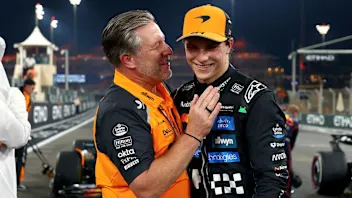 Piastri ‘should be proud’ of his season says Brown
Piastri ‘should be proud’ of his season says Brown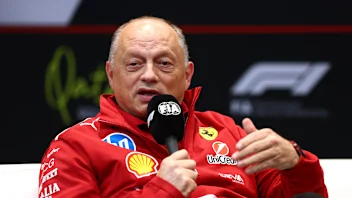 Abu Dhabi 'not a bad weekend' for Ferrari – Vasseur
Abu Dhabi 'not a bad weekend' for Ferrari – Vasseur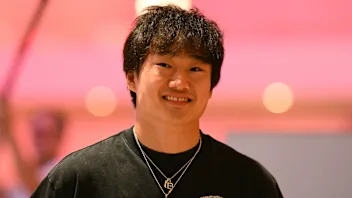 Tsunoda's best moments in F1 as he departs the grid
Tsunoda's best moments in F1 as he departs the grid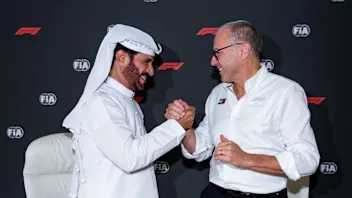 F1, the FIA and 11 teams sign 2026 Concorde Agreement
F1, the FIA and 11 teams sign 2026 Concorde Agreement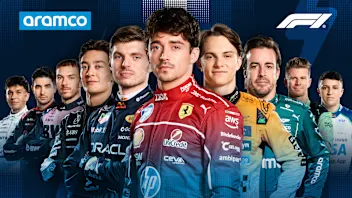 Power RankingsWho dazzled our judges at the finale in Abu Dhabi?
Power RankingsWho dazzled our judges at the finale in Abu Dhabi? Sainz hopes point-less finish in Abu Dhabi ‘serves as a wake-up call’
Sainz hopes point-less finish in Abu Dhabi ‘serves as a wake-up call’